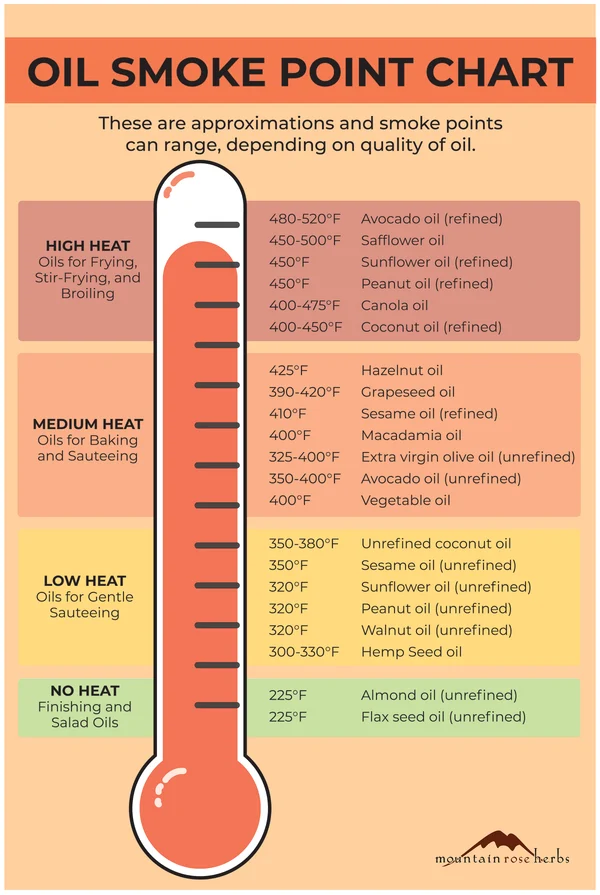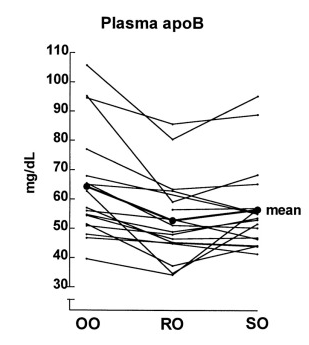A_User
#765
I don’t think you’ve answered my question. I asked when replacing what. That study is comparing canola oil with lots of different things. Your EVOO reducing apoB studies are probably different.
When you test canola oil vs saturated fat, of course it reduces apoB. Just like it does in the study you linked.
L_H
#766
Did you read the papers i linked above?
A_User
#767
For example, this study on olive oil from probably the same group showed no significant difference in apoB compared to other oils.
Results: Twenty-seven trials, comprising 1089 participants met the eligibility criteria. Results of this study showed that compared to other plant oils, high-density lipoprotein level increased significantly more for OO (1.37 mg/dl: 95% CI: 0.4, 2.36). Also OO consumption reduced total cholesterol (TC) (6.27 mg/dl, 95% CI: 2.8, 10.6), Low-density lipoprotein (LDL-c) (4.2 mg/dl, 95% CI: 1.4, 7.01), and triglyceride (TG) (4.31 mg/dl, 95% CI: 0.5, 8.12) significantly less than other plant oils. There were no significant effects on Apo lipoprotein A1 and Apo lipoprotein B.
1 Like
Because in order to really move apoB down, you need to resort to meds. Sources of unsaturated fat are all great. Besides, the size of the LDL-p doesn’t matter because they can all oxidize.
1 Like
A_User
#769
I am looking at it, and there was statistical significance in decreasing apoB when replacing saturated fat.
I don’t have access to the full paper to the one comparing olive oil with canola oil, but the reason for the insignificance can simply be because of a lack of trials that measure apoB.
L_H
#770
If you read the papers i linked:
This systemic review of RCTs looking at switching to canola oil (from other veg oils) shows that canola oil does NOT reduce APO b
Whereas for EVOO:
“A significant decrease in Apo-B/Apo-A1 ratio (p<0.01) was also observed in group B” group b was a 4g capsule of olive oil intervention Effects of extra virgin olive oil supplementation at two different low doses on lipid profile in mild hypercholesterolemic subjects: a randomised clinical trial - PubMed
And
“The study by Hernaez et al. [53] also reported a decrease in total LDL particles and apo B100 with a total phenol content of 366 mg/kg compared with a refined olive oil.”
Rather than chasing this around, can you tell me which of these you still believe to be true. Just so I can understand where you disagree
Do you still think LDL c and apob are interchangeable?
Do you still think this is true given the negative result for apo b?
2 Likes
L_H
#771
I have to disagree. I think it’s possible for many people to keep apob down with lifestyle measures. Not everyone of course, but for many, a high fibre diet, exercise, fish oils and EVOO can collectively do most of the heavy lifting. And it’s important to note that they also benefit inflammation, blood sugar, and blood pressure.
It’s argued by Dayspring and others that the size of the ldl-c particle matters because it affects the correlation between ldl-c and apoB. They argue that ldl-c is only of interest re cardiovascular disease because of the correlation it has with APO b. So when things like fish oil and olive oil have a big impact on that correlation, ldl-c is no longer a useful metric.
Oxidation of ldl-c is an independent variable, that’s improved by olive oil.
Given the other benefits of olive oil (BP, blood glucose, inflammation markers) it seems sensible for Bryan Johnson to opt for EVOO. And I can’t see why anyone would recommend canola oil instead. (Other than price)
4 Likes
A_User
#772
That’s where my picture is from. It shows apoB decreases when replacing saturated fat.
That study does not have a control group.
No, the correlation between LDL-c and apoB is so high that if a study is statistically significant for LDL but not apoB, because of for example more trials measuring LDL, then I believe it will probably decrease apoB as well.
Yes, because of the high correlation between LDL and apoB.
2 Likes
L_H
#773
I don’t think you could have read the “The Debate is Over” paper I posted above. It explains why apo b is the better metric. And where/why the correlation between ldl-c and apob breaks down. (E.g. it is affected by fish oil and EVOO.)
Ldl-c is a volume measure. ApoB is a particle count.
So if fish oil and olive oil increase the size of the particles, that will affect the correlation between the two. If canola oil shrinks the size of the particles that too will affect the correlation.
If you can’t be bothered going through the paper, Tom Day spring does a great job explaining it: #20 - Tom Dayspring, M.D., FACP, FNLA – Part I of V: an introduction to lipidology - Peter Attia
But we’re discussing Canola Oil v Olive Oil. Not Canola Oil vs saturated fat. That could be from MacDonalds 
The RCT shows canola oil does NOT reduce apo b compared to sunflower oil etc. Whereas there’s evidence that extra virgin olive oil does.
There’s even evidence that processed olive oil reduces Apo b compared to sunflower oil!!
1 Like
A_User
#774
Yet the meta analysis I linked showed no difference between olive oil and other oils, and apoB:
Why didn’t the trial show a decrease in apoB from using olive oil, in comparison to canola oil?
You shouldn’t be satisfied with the result you are exclaiming so many times. You want a statistically significant increase in apoB.
L_H
#775
Why would I want to increase my apoB??
You asked me for evidence that EVOO lowers apo b compared to other vegetable oils, so i gave you multiple papers showing significant results for EVOO.
By contrast you haven’t presented any data showing that canola oil lowers apob compared to other vegetable oils. None at all.
The study you linked is an abstract only.I can’t access the full article, I can see that it’s based on pre 2017 data, but i can’t tell anything else about it. Is it looking at EVOO even? Can you provide a link to the full article? Or are you relying on the abstract?
You seem intent on sticking to your opinions, that’s fine but I can’t pretend you’re being logical when you ignore data regarding the apo b, blood pressure, blood glucose, and inflammation benefits of EVOO.
It seems like the data is irrelevant to your opinion.
1 Like
Many of the citations @A_User uses for his arguments did not use cold-pressed EVOO. In my opinion, it is the only valid comparison because it is the one most of us use for health benefits.
Also, most of the canola comparisons are not valid as they did not mention the source and processing of the canola oil.
Both canola oil and olive lose much of their benefits from the processing of the oils. Many of the studies he cites did not use cold-pressed EVOO, which is the only form that retains the full benefits of olive oil.
9 Likes
[quote=“AnUser, post:777, topic:4228”]
apoB
[/quote]Of course, you didn’t really read all of the citations I previously posted, but the bottom line is:
I will consume my daily shot of EVOO, not canola oil.
I use canola oil, not EVOO for cooking.
The only forms of canola oil or olive oil that are significantly healthy are the unprocessed forms.
“Is Canola Oil Bad for Your Health?
It’s generally considered safe for consumption. However, it’s extracted using harsh chemicals, which can leave behind harmful residues. Additionally, it’s often genetically modified, which may have long-term health consequences.”
Here is a blog that shares most of my thoughts concerning EVOO and canola oil.
Canola Oil vs Olive Oil: Which is Better? – EXAU Olive Oil.
3 Likes
LaraPo
#779
Why not to use avocado oil for cooking? Isn’t it better than canola?
1 Like
Some oils start burning at lower temperatures, (the oils “smoke point”).

9 Likes
L_H
#781
I’m not sure i understand. But in the systematic review pdf you link there is only one study included which looks at the apob impact of virgin olive oil vs sunflower oil. And none which compare virgin olive oil with canola oil. None.
The one study is from 2003 by Aguilera et al. It was only in 20 people and the amount of oil isn’t specified in the study. I can’t access the full study on my phone, but I can see from the abstract that it found a significant positive result in favour of olive oil for lowering oxidation of ldl.
No, but the systematic review of RCTs you originally linked shows there is NO significant reduction in Apob from canola oil compared to sunflower oil. I’m surprised you’re still disputing this when you posted the study.
If there’s evidence that EV olive oil lowers apob compared to sunflower oil…
And there’s evidence that canola oil does NOT lower apob compared to sunflower oil…
Then yes, in the absence of direct comparison, you can treat that as reasonable evidence in favour of EV olive oil. Especially when there’s evidence of other benefits from EVOO (inflammation, blood pressure, blood glucose, oxidation of LDL etc)
I’m not sure why you find this logic hard to accept? Have you just bought into a canola oil farm? 
2 Likes
L_H
#782
Choosing the best fat for cooking is a research rabbit hole! A few years ago I got so lost down it, I ended up finding it easier to avoid frying altogether! I remember there was some evidence that animal fats might even be superior. But that may be out of date.
If anyone has up to date data, id love to see it.
1 Like
A_User
#783
Here’s a study showing apoB being 20% higher with extra virgin olive oil compared with canola oil:
apoB concentrations were approximately 20% higher after OO compared with RO and SO (ANOVA, P ⩽ 0.003);

An olive oil-rich diet results in higher concentrations of LDL cholesterol and a higher number of LDL subfraction particles than rapeseed oil and sunflower oil diets
https://www.sciencedirect.com/science/article/pii/S0022227520323518
2 Likes
Guys - I just wanted to jump in briefly to thank you for this fascinating discussion. You have both presented some really good information that I have been unaware of and I think this type of discussion is fantastic as I get to see all the pros and cons of the related issues.
Highly educational for me (and I’m sure many others)!
4 Likes
L_H
#785
I think you proved my point. Your a priori belief is leading you to scrape for evidence that supports your position. Rather than looking at the weight of evidence and forming a belief based on that data.
The study you found is
Very Old, it’s from the year 2000!!
Small. Its only 18 people
Using a mystery olive oil rather than EVOO
Using an outdated methodology for estimating apo B. “Cited by (0)”
If you listen to the Tom Dayspring/ Pete Attia podcasts I linked.above, there’s a great section on the actual testing methodologies of apoB and LDL-C. The methodology has changed enormously since 2000. And part of the reason apoB is now the preferred metric is due to standardization and accuracy improvements in apob testing in the 2000s.
If you’re relying on 24 year old, small, single study which hasn’t been cited by anybody and looks at only a single parameter, then you have to ask yourself why?
4 Likes